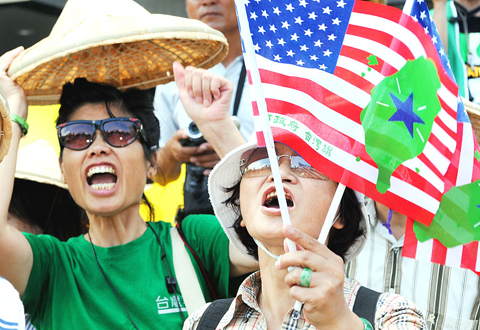More than 300 protesters gathered in front of the American Institute in Taiwan (AIT) yesterday to urge the US to recognize Taiwan as an incorporated territory and assume full authority for its “military occupation.”
Waving a self-designed US Military Government flag — the shape of Taiwan superimposed on a US flag — the protesters, led by attorney Roger Lin (林志昇), chanted anti-government slogans and called for the expulsion of the Republic of China (ROC) “government-in-exile.”
In December 2006, Lin and a group of expatriates sued the US government, arguing that although Japan relinquished its claim over Taiwan after World War II, it did not hand it to China.

PHOTO: CNA
Since the US took occupied Japan and its overseas territories following victory in the war, the US was responsible for the final disposition of these areas, including Taiwan, the group said.
Lin said yesterday that according to the US State Department’s definition of terrorist groups, the ROC military establishment shares many traits with al-Qaeda.
Lin presented information in a manila envelope to AIT press officer Christopher Kavanagh and asked him to relay it to US Secretary of State Hillary Clinton.
Lin said if Clinton failed to respond to his plea, he would provide the information to major international media outlets.
The protesters were met by police who guard the AIT compound.
The crowd dispersed peacefully after Lin’s brief meeting with Kavanagh.
In Lin’s court case in the US, he said the San Francisco Treaty, which marked Japan’s surrender of Taiwan, did not say who should assume control of Taiwan and thus that it remains under the jurisdiction of the US. He said Taiwanese are entitled to be nationals, although not voting citizens, of the US, with US passports.
In April, the US Court of Appeal in Washington ruled in favor of the US government in an appeal of a district court ruling.
“Addressing [the] Appellants’ claims would require identification of Taiwan’s sovereign. The Executive Branch has deliberately remained silent on this issue and we cannot intrude on its decision,” the judges said.

A preclearance service to facilitate entry for people traveling to select airports in Japan would be available from Thursday next week to Feb. 25 at Taiwan Taoyuan International Airport, Taoyuan International Airport Corp (TIAC) said on Tuesday. The service was first made available to Taiwanese travelers throughout the winter vacation of 2024 and during the Lunar New Year holiday. In addition to flights to the Japanese cities of Hakodate, Asahikawa, Akita, Sendai, Niigata, Okayama, Takamatsu, Kumamoto and Kagoshima, the service would be available to travelers to Kobe and Oita. The service can be accessed by passengers of 15 flight routes operated by

MORE FALL: An investigation into one of Xi’s key cronies, part of a broader ‘anti-corruption’ drive, indicates that he might have a deep distrust in the military, an expert said China’s latest military purge underscores systemic risks in its shift from collective leadership to sole rule under Chinese President Xi Jinping (習近平), and could disrupt its chain of command and military capabilities, a national security official said yesterday. If decisionmaking within the Chinese Communist Party has become “irrational” under one-man rule, the Taiwan Strait and the regional situation must be approached with extreme caution, given unforeseen risks, they added. The anonymous official made the remarks as China’s Central Military Commission Vice Chairman Zhang Youxia (張又俠) and Joint Staff Department Chief of Staff Liu Zhenli (劉振立) were reportedly being investigated for suspected “serious

ENHANCING EFFICIENCY: The apron can accommodate 16 airplanes overnight at Taoyuan airport while work on the third runway continues, the transport minister said A new temporary overnight parking apron at Taiwan Taoyuan International Airport is to start operating on Friday next week to boost operational efficiency while the third runway is being constructed, the Ministry of Transportation and Communications said yesterday. The apron — one of the crucial projects in the construction of the third runway — can accommodate 16 aircraft overnight at the nation’s largest international airport, Minister of Transportation and Communications Chen Shih-kai (陳世凱) told reporters while inspecting the new facility yesterday morning. Aside from providing the airport operator with greater flexibility in aircraft parking during the third runway construction,

American climber Alex Honnold is to attempt a free climb of Taipei 101 today at 9am, with traffic closures around the skyscraper. To accommodate the climb attempt and filming, the Taipei Department of Transportation said traffic controls would be enforced around the Taipei 101 area. If weather conditions delay the climb, the restrictions would be pushed back to tomorrow. Traffic controls would be in place today from 7am to 11am around the Taipei 101 area, the department said. Songzhi Road would be fully closed in both directions between Songlian Road and Xinyi Road Sec 5, it said, adding that bidirectional traffic controls would